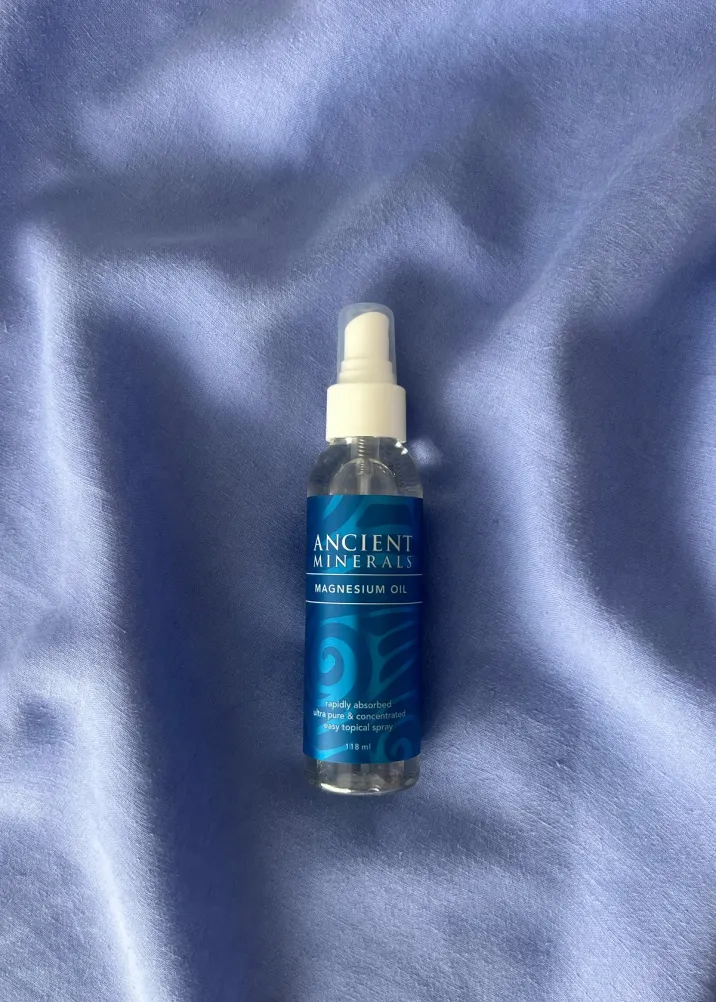
Does Magnesium Oil Actually Help With Sleep? I Tried It Out
I think I’ve found my new favourite thing.
My relationship status with sleep has always been ‘it’s complicated’. And similar to any complicated relationship, sleep and I have our highs and lows. Sometimes we’re the best of friends, and other times I struggle to understand it and long for the times where there was never an issue.
Because of my volatile relationship with going to bed each night, I’m constantly on the search for hacks and remedies to aid sleepless nights and tired days.
One sleep aid which caught my eye recently was magnesium oil. From people singing its praises on my FYP to doctors explaining the benefits in research papers online, I was seeing it everywhere and I knew I had to try it.
Below I unpack the benefits of magnesium, and what using magnesium oil for a week did for my complicated relationship with sleep.
Why is magnesium important?
Magnesium is an important nutrient that has multiple functions within the body. It’s important to monitor and have consistent magnesium intake as the body does not produce it naturally. Some of the many benefits of magnesium include:
- maintaining blood sugar and blood pressure levels
- helping to support protein, bone, and DNA health
- regulating nerve and muscle function
“Research shows that magnesium blocks N-methyl-D-aspartate (a receptor in your body that can hinder your sleep) and stimulates gamma-aminobutyric acid (a receptor that can promote good sleep),” said Dennis Auckley, MD, director of MetroHealth’s Center for Sleep Medicine.
“Studies looking at the effects of oral magnesium have shown that taking it may be linked to better self-reported sleep quality and less daytime sleepiness — but traditional magnesium supplements taken orally can sometimes come with side effects in your gut, so putting magnesium on your skin could help to avoid this.”
Enter: magnesium oil.
How is magnesium oil different from other forms of magnesium?
Unlike magnesium supplements, magnesium oil is applied directly to the skin. Applying magnesium topically helps to get the mineral into your lymphatics and circulatory system, allowing you to get a higher concentration of magnesium in the bloodstream.
When I was doing my research on magnesium oil, I discovered that the pores on our feet are some of the largest on our body, making them one of the most effective areas for application and absorption.

The takeaway
If you’re like me and get excited about having a new cosmetic product to douse your body in, please DO NOT do what I did and apply the magnesium oil all over your body. The first minute after its initial application was fine, but the 30 minutes of prickly stinging after was not. If you are trying magnesium oil for the first time, start with a small amount and gradually build it up each night to reduce the chances of you needing to take a panicked shower at 11 pm because you feel like you’re on fire.
My second piece of advice is to only apply it to the bottom of your feet. After a few nights of applying it to multiple areas of my body, I tried just putting it on the soles of my feet and found the results were the same.
Finally, I am pleased to say that this stuff works. Like really works. Even after my first night of pain and discomfort, I still had one of the most restful night’s sleeps I’ve had in a while. After I found what amount and areas of application worked for me, the magnesium oil was sending me off to sleep within 30 minutes – and kept me asleep for the next 8 hours until my alarm went off.
If you feel like you’ve exhausted all viable sleep remedies but are yet to give magnesium oil a go, do your mind and body a favour and trial this magical elixir for at least a week. I am confident it will become a non-negotiable in your evening routine!
If you plan to use magnesium oil on your feet to help you sleep, make sure you carefully follow the directions to make sure you are taking the proper dosage. Most importantly, consult your doctor about your intentions, especially if you have a history of cardiovascular complications, or issues with the heart and blood vessels.
Elevate Your Evening Routine
Enjoyed This?
Discover more sleeping hacks.










